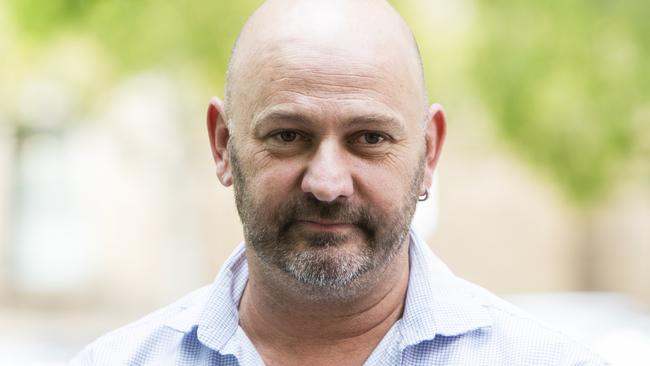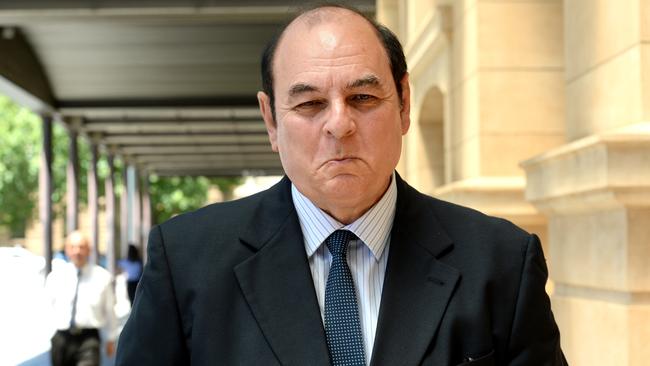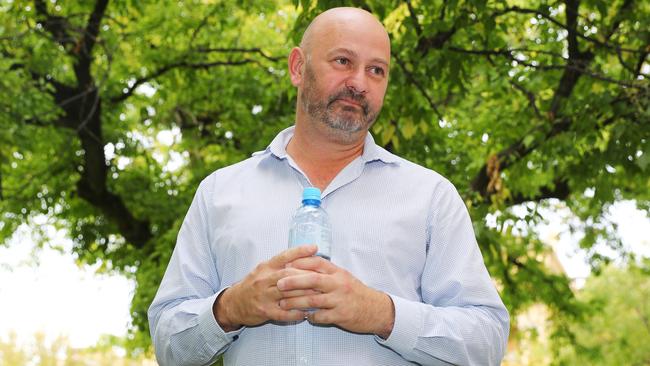Greg Trembath, survivor of St Ignatius College child abuser Stephen Hamra, speaks out with allegations of dozens more victims
Greg Trembath was abused by St Ignatius College teacher Stephen Hamra for nearly a decade – having confronted him, he’s now rebuilding his life.
Police & Courts
Don't miss out on the headlines from Police & Courts. Followed categories will be added to My News.
There is a floorboard in Greg Trembath’s childhood home – just one, halfway between the loungeroom and his bedroom – that squeaks.
For nine years, that tiny sound horrified Mr Trembath each and every time he heard it, for it meant trusted family friend Stephen Hamra was on his way to sexually abuse him.
It would take Mr Trembath almost four decades to muster the mental and emotional strength to confront Hamra in court and secure his abuser’s 12-year prison term.
But victory does not erase past trauma, and a jail cell can never remove a monster from the mind of the child within the grown man.
“Since the trial, the reaction is less but it’s still there … I’ll drive past the Hamra Library, which was named for his father, and my skin crawls,” Mr Trembath said.
“It’s his father’s name, I know that, but it’s his name as well.
“I know I’m safe, I know that – if faced with anything like that again – I can protect myself.
“But it up-ends reality, and you’re always brought back to being that seven-year-old little boy who’s scared, and who doesn’t understand what’s happening.”
“NO ONE WILL BELIEVE YOU”

From 1977 to 1986, Mr Trembath was abused by Hamra – a St Ignatius College teacher whose father was a former Mayor of West Torrens.
Though not a St Ignatius student, Mr Trembath came to know more than 50 other boys and young men – many of whom, he suspects, were also abused.
“Hamra would bring them to our house or take them to his holiday house at Goolwa … there would be a group of us sleeping on the floor in sleeping bags,” he said.
“There were many, many kids.”
Mr Trembath was 19 when his parents learned he had been abused and they were immensely supportive – both of his trauma and his decision, at the time, not to go to police.
“We are talking about the late 1980s and early 1990s, when I was 19 or 20, and there was no way (at that age) I was going to put myself in that position,” he said.
“At that age, you’re still trying to process this shit.
“While I knew I might be able to stop him, you’re conditioned to think that no one is going to believe you … you’ve had that drummed into you.”
His disclosure came, ultimately, by chance – he was visiting his parents, years later, when police knocked on the door to ask them what they knew about Hamra.
Upon hearing the name of his abuser, Mr Trembath collapsed against a nearby doorframe and, following some discussion, agreed to give a statement.
What followed was a torturous, protracted and emotionally scarring series of court hearings, a trial in which he gave evidence and ultimately, in April 2018, there was a conviction.
“I can honestly say one of the hardest days for me was the day we got ‘guilty’ … going through the whole process, I never allowed myself to process a guilty verdict,” he said.
“I knew what had happened and I knew my truth but, to keep myself sane, I never allowed for ‘guilty’.
“When the verdict came, it meant that 12 people had believed me … it’s moments like that which still cut me, emotionally.”
“IT’S NOT YOUR FAULT”

After Hamra’s sentencing, Mr Trembath waived his legal right to anonymity and gave The Advertiser permission to identify him.
It is a decision which, he said, he stands by to this day.
“I waived my right to being anonymous because what was done to me was not my fault,” he said.
“My position was, and still is, there are many people out there that have been through this and they need to know that you can survive and that it’s not their fault.”
His stance led to multiple media interviews and contact from other child abuse survivors praising his courage.
Mr Trembath said full disclosure was not for everyone, and that victims and survivors should always be allowed to choose their own manner of healing.
“It’s a really hard thing to become a survivor … you have to protect yourself, but it also stops you being your whole self,” he said.
“As someone who’s been through it, this journey is much, much tougher than people think it will be … to come forward is not only brave, it’s terrifying.
“Whatever you do, you have to do it for your own journey – not because I want you to do it or because the world wants you to do it.
“I feel I’m an exceptionally fortunate person in that I had amazing people around me, that not one of them disbelieved me, I had support and I was cared for and loved.
“A lot of people don’t have that.”
“GIVE HIM NO POWER”

Mr Trembath said that, despite the passage of time, he still dealt with “the aftermath” of the abuse and the “extraneously long trial process” each and every day.
“I’ve half hoped someone else would come forward legally … one more victim would put Hamra away for a lot longer,” he said.
“But as I’ve said, that process is very hard and so I understand why people don’t.
“I also understand why people file lawsuits – because I think of what I’ve spent on psychologists, mental health and wellbeing.
“If I’d pursued a Victims of Crime payment, the maximum I would have been entitled to was $10,000 … that doesn’t even touch the sides of what I’ve spent.”
Mr Trembath said he hoped other survivors would be able to come to terms with their experiences and heal in the manner most helpful for and suitable to them.
“If you read this and you’re struggling, reach out to someone – a friend, a counsellor, I’m not a counsellor but even to me if you want to talk,” he said.
“One thing I would say to every victim out there is that it’s not the physical abuse you need to work on, it’s the mental abuse.
“It’s the way in which you were mentally made to feel that, if you told someone, that you were wrong and that you had done something wrong … that’s when the abuser still has power over you.
“After Hamra was sentenced I said ‘if he was on fire, I wouldn’t pick up a can of petrol and throw it on him but I wouldn’t put him out, either’.
“I still say that today, I’m not allowing him to have any power.”
——————
If you or someone you know has experienced sexual assault, help is available from the national domestic, family and sexual violence counselling, information and support service on 1800 RESPECT.
Survivors and their families can also access a free, confidential peer support service through the Survivors and Mates Support Network at samsn.org.au





